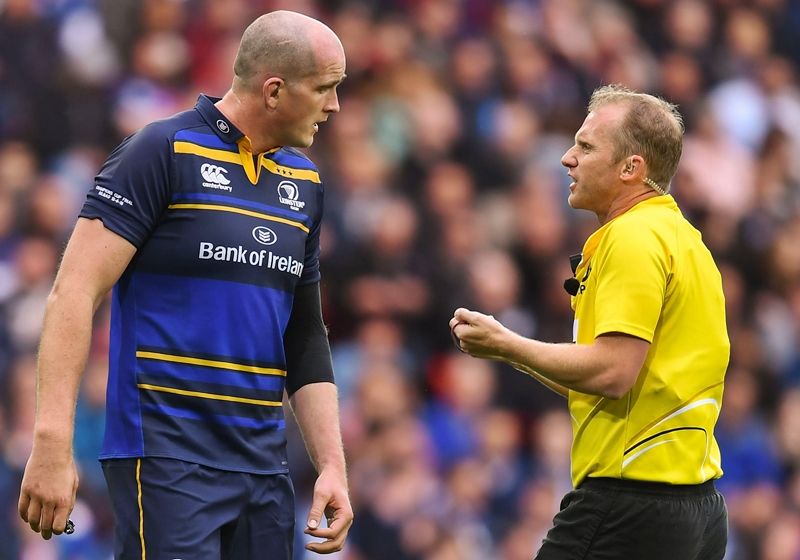Some hard but considered comments here.
The 2017/18 Champions Cup final turned out to be a sluggish, error-prone and fraught affair. As if often the case when that happens, the match officials feel the heat.
Racing came to Bilbao to get Leinster into a scrap and to knock them off track. Having previously torn the likes of Glasgow, Saracens and Scarlets apart, the plan worked really well for most of the game. Ultimately, though, Leinster won out 15-12 with captain Isa Nacewa kicking two late penalties.
At the end of the game, when Barnes and his fellow match officials were being presented with commemorative medals, there were boos from both Racing and Leinster fans. You can’t please everyone and, as some refs would attest, sometimes you can please no-one just by doing your job.
The performance of Barnes and his assistants came under scrutiny during The Hard Yards [from 15:00 below] with James Downey not holding back with some of his comments.

Barnes set an early precedent with a penalty that went Leinster’s way for a high tackle. Rob Kearney ducked as he attempted to get by, or through, Henry Chavancy and Leinster were awarded the penalty.
The English referee kept this up throughout the game and both Kearney and Leavy were pinged for what Barnes deemed to be high tackles.
Post-match, Johnny Sexton remarked about how Racing had been allowed to slow down ruck ball and many Blues supporters felt the French side played offside for much of the game.
“I didn’t think it was his best game, but for both teams, to be honest,” Downey said.
“From previous dealing with Wayne Barnes, he does like to be the centre of attention.
“He likes to make decisions that can have an influence on the game. He sent off Dylan Hartley in that [2013 Premiership] final. It’s always kind of about him.
“He was a little inconsistent. Like, look at Leone Nakrawa’s knock-on. He knew it was a straight yellow when he did it. Some of the things he did were inconsistent but for both teams.”
Downey also noted how Barnes rarely left his arm out for advantage and allowed play to develop. Rather, if he spotted an infringement there was a rapid penalty call and play was stopped.
Most top sides would agree that if you concede 10 penalties or more in a game, you will most likely end up losing. Barnes penalised Leinster 10 times but Racing were blown up on 13 occasions. “The touch judges were certainly influential,” Downey continued, “as play would be going on and Barnes would get the call and then bring play back for a penalty.”
Former Leinster centre Eoin O’Malley agreed with Downey that Saturday was not Barnes’ finest hour and he admitted to be confused, at times, with some of the referee’s calls. “I don’t know which side he favoured really but, as a game, he just slowed it up,” said O’Malley.
“The amount of times he blew his whistle seemed huge. We didn’t ever seem to get a massive amount of phases in the game, and that’s where it gets looser and fellas get more space.”





































